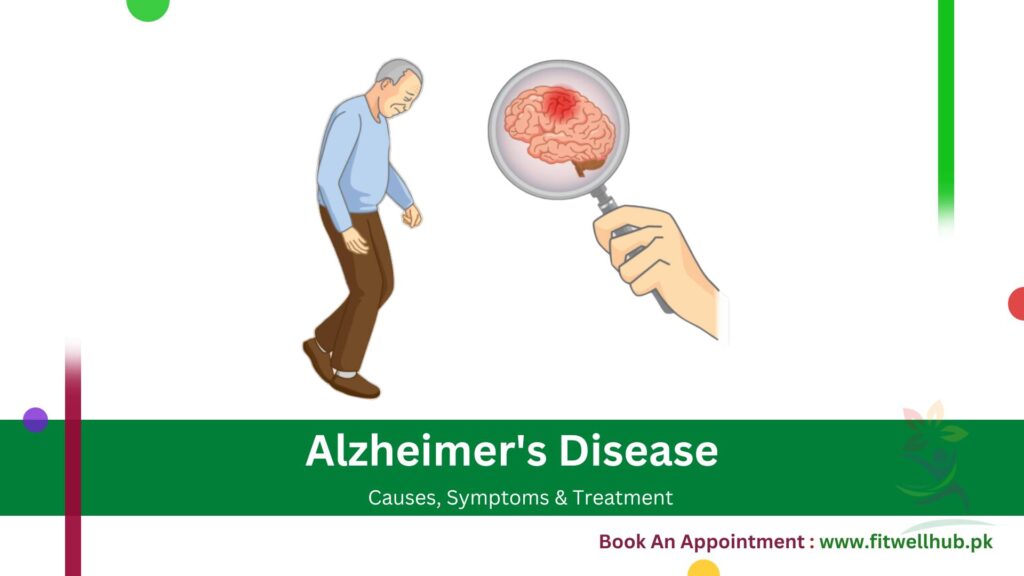Alzheimer’s disease is known as the common cause of dementia, a progressive neurodegenerative problem that can affect cognitive functions, ability to do daily tasks, and memory. Millions of people are affected by Alzheimer’s, which significantly affects people above 65 of age. It is usually caused by a gradual build-up of abnormal proteins in the brain, particularly tau tangles and beta-amyloid plaques. Such deposits suddenly destroy and damage the brain cells, resulting in serious cognitive decline. The early symptoms of Alzheimer’s are usually confusion and forgetfulness, leading to significant disorientation, behavior changes, and memory loss.
Quick Links
ToggleWhile the definite cause of Alzheimer’s is still unknown, lifestyles, genetics, and age factors increase the risk of its development. Although no effective method is found to cure it, some treatments can reduce its symptoms and temporarily minimize its growth. Ongoing research focuses on revealing more effective treatments and preventive measures to manage this growing health concern globally.
Want to learn about anxiety disorders? Click HERE
Symptoms
Alzheimer’s disease can be diagnosed by a variety of symptoms such as physical, behavioral, and cognitive that may worsen with time. Although memory loss is frequently an early symptom, other signs can also significantly impact the activities and functioning of daily life. Some of the common symptoms are discussed here:
- Memory Loss
- Difficulty in Planning
- Disorientation
- Communication Problems
- Changes in Mood and Personality
- Poor Judgement
- Loss of Initiative
GET IN TOUCH
Book An Appointment
When to See a Doctor
If you or your family members start showing signs like losing memory constantly or being confused while performing ordinary tasks, you should consult a medical professional immediately. Early intervention can help control symptoms, slow down the progress of the disease, and improve quality of life. If someone has sudden behavioral changes such as mood swings or becomes easily irritated by minor issues, he or she should undergo a checkup too.
FitwellHub offers expert Healthcare services that can examine, diagnose, and provide continuous support for Alzheimer’s patients. If you are worried about symptoms, visit FitwellHub’s all-inclusive healthcare services available now. Our expert crew will be ready and available to aid with personal care tailored to your requirements.
Causes
Alzheimer’s disease can be caused by environmental, lifestyle, and genetic factors, damaging the brain’s cells slowly. The main cause is still unknown, but various factors have been recognized as causes of Alzheimer’s.
- Genetic Mutations: Genetic mutations, especially in the gene of APOE-e4, increase the chances of Alzheimer’s disease development. Although gene mutations don’t ensure disease development they can lead to the accumulation of harmful proteins in an individual’s brain, resulting in Alzheimer’s disease.
- Beta-Amyloid Plaques and Tau Tangles: The buildup of tau tangles and beta-amyloid plaques in an individual’s brain is the main reason for Alzheimer’s. Such proteins create abnormal tangles and clusters, disturbing the communication among the brain’s cells and causing cell death.
- Inflammation: Another cause of Alzheimer’s development is the severe swelling in the brain, caused by the build-up of harmful proteins, further damaging the brain’s cells and leading to cognitive decline.
- Cardiovascular Disease: Conditions such as heart disease, diabetes, and high blood pressure are the reasons to increase the chances of Alzheimer’s development. Cardiovascular disease can block the blood’s flow, causing cell damage, and leading to cognitive impairment with time.
- Brain Injury: TBI (Traumatic Brain Injury) may also develop Alzheimer’s disease in old age. Head injuries, especially repeated ones, may cause variations in the structure of the brain, making a person susceptible to Alzheimer’s disease.
Risk Factors
Various risk factors can increase the chances of Alzheimer’s development such as:
- Age
The common risk factor for developing Alzheimer’s disease is age, as most of its cases are found in people of age above 65. The accumulation of harmful proteins increases as the brain ages and becomes more exposed to damage. - Family History
The chances of Alzheimer’s disease increase in an individual with a family history of Alzheimer’s, particularly when several relatives are affected, indicating a prominent genetic influence. Certain genes like APOE-e4 are associated with a higher risk of developing Alzheimer’s. Although genes alone can’t lead to Alzheimer’s disease, they contribute to sensitivity. - Chronic Health Conditions
Conditions such as hypertension, obesity, and diabetes are associated with greater chances of Alzheimer’s development. These diseases affect the brain and cardiovascular health, producing conditions that lead to Alzheimer’s development and faster growth. - Lifestyle Factors
A sedentary lifestyle, heavy alcohol consumption, and smoking can cause cognitive decline. Brain health can worsen with these habits, leading to oxidative damage, reduced blood flow, and inflammation.
Complications
Alzheimer’s disease may lead to many complications that occur with the damage to the brain. Due to a decline in cognitive functions, the capability to do routine tasks and manage environmental or physical challenges diminishes.
- Inability to Communicate
- Malnutrition and Dehydration
- Infections
- Falls and Injuries
- Difficulty Swallowing
- Bedsores
Complications frequently arise when patients have difficulty in effective communication of their needs. Such as weight loss, dehydration, and malnutrition are common because people forget to drink or eat, or may have difficulty swallowing food properly. This may lead to aspiration pneumonia or choking, and worsen the immune system, making patients more prone to infections such as urinary tract and pneumonia.
Alzheimer’s may increase the risk of falling and injuries because of mobility issues, disorientation, or poor balance. Additionally, this disease can cause bedridden patients to develop pressure sores, particularly when they are less mobile. These complications may become life-threatening, especially in the last stages of Alzheimer’s, and require significant medical attention.
Prevention
Although Alzheimer’s disease can’t be cured completely, certain lifestyle changes can minimize the risk factors:
- Regular Exercise: Regular exercise and other physical activities can assist in maintaining brain function and overall health. Exercise is linked with fewer chances of Alzheimer’s and cognitive decline.
- Healthy Diet: A healthy diet including vegetables, fruits, lean proteins, and whole grains ensures good brain health. Diet plans like DASH or Mediterranean diets are associated with decreased chances of Alzheimer’s.
- Mental Stimulation: Engaging in challenging activities associated with the brain including solving puzzles or riddles, reading, and learning new experiences can lead to better cognitive reserve and alleviate the symptoms of Alzheimer’s.
- Social Engagement: Engaging in social activities and managing good social connections can help build strong cognitive health and decrease Alzheimer’s risk.
- Heart Health: It is important to maintain better cardiovascular health. Alzheimer’s risk can be minimized by managing cholesterol levels and high blood pressure.
- Adequate Sleep: Strong brain health and cognitive function can be achieved with quality sleep. Maintaining sleep disorders and good sleep hygiene can decrease the risks of Alzheimer’s.
FitwellHub offers innovative healthcare solutions designed to empower individuals in preventing chronic diseases. They provide tailored plans focused on cognitive health, exercise, and diet. For more information about smart healthcare solutions that can assist you in achieving your health goals, visit HERE.
Diagnosis
Alzheimer’s diagnosis includes assessing a patient’s symptoms and medical history and performing tests to inspect other medical conditions. Although no single test can directly diagnose Alzheimer’s, doctors assess brain health and cognitive function by using several methods.
Tests
- Cognitive and Memory Tests: Such tests are used to examine problem-solving, memory, language skills, and attention to inspect cognitive decline.
- Neuropsychological Testing: The comprehensive assessment of cognitive capabilities by standardized tests measures memory and thinking.
- Brain Imaging (MRI, CT scans): These scans indicate the existence of beta-amyloid plaques, brain atrophy, or other structure variations.
- Blood Tests: Blood tests are done to stop the cognitive decline’s possible causes like vitamin deficiencies or thyroid disorders.
- Spinal Fluid Analysis: A lumbar puncture may be performed to measure amyloid and tau levels in cerebrospinal fluid.
- To calculate the tau and amyloid levels in cerebrospinal fluid, a lumbar puncture can be performed.
FitwellHub facilitates well-equipped labs with a variety of comprehensive services for effective diagnosis such as advanced brain imaging tests and cognitive assessments. To learn more about scheduling tests or other services, visit FitwellHub Lab.
Treatment
Although Alzheimer’s disease has no known cure, several treatments can help alleviate the symptoms and improve the quality of life.
- Medications can improve memory loss, confusion, and other behavioral disorders that come along with Alzheimer’s disease.
- The therapies that aim to support mental activity and everyday life skills are vital in managing Alzheimer’s.
- Managing behaviors can help reduce the stress caused by changes in the environment for Alzheimer’s patients, leading to an improved quality of life.
Medications
Medications can help in alleviating Alzheimer’s symptoms such as confusion, behavioral changes, and memory loss.
- Cholinesterase Inhibitors (e.g., Donepezil, Rivastigmine): These medicines stop acetylcholine’s breakdown, an important chemical in the brain for learning and memory.
- Memantine (Namenda): This medicine helps in maintaining the glutamate, is responsible for information processing, and helps with cognition and memory.
- Antipsychotics and Antidepressants: This medication can be suggested by doctors to manage aggression, depression, and mood swings frequently caused by Alzheimer’s.
Fitwell Hub’s pharmacy provides a variety of medicines that can be suggested by a doctor for the treatment of Alzheimer’s. They make sure to provide you with accurate medicines as prescribed. To explore their services, visit FitwellHub’s pharmacy.
GET IN TOUCH
Book An Appointment
Frequently Ask Questions (FAQ’s)
Alzheimer’s disease’s main cause is still unknown but it includes the accumulation of abnormal proteins such as tau tangles and beta-amyloid plaques in the brain.
Alzheimer’s is still incurable, but some treatments are used to alleviate its symptoms and progression.
In some cases, Alzheimer’s is genetic particularly when gene mutations such as APOE-e4 are present.
Alzheimer’s causes progressive confusion, difficulty in doing daily tasks, and memory loss, causing cognitive functions to decline.
Early symptoms include memory loss, confusion, and difficulty remembering recent events or performing simple tasks.














